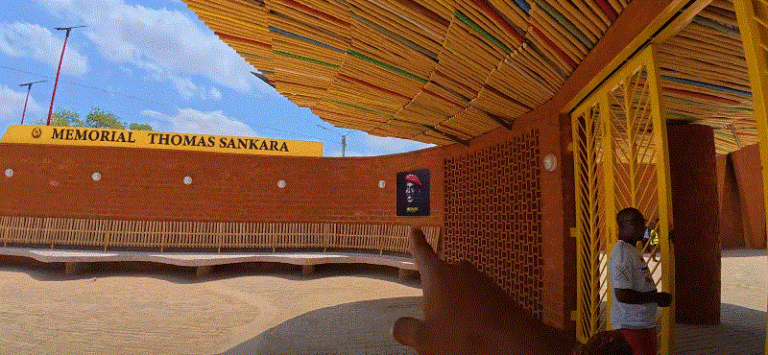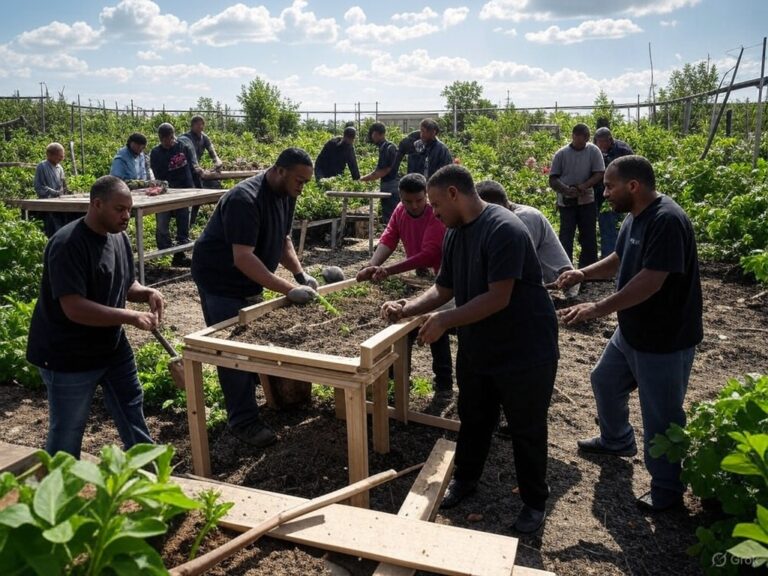Sunlight descended into the golden phase as I embarked on my evening stroll through the deserted streets. The surrounding air warmed the day while jacaranda trees released their subtle flower aroma, which allowed my thoughts to float like leaves carried by the gentle wind. This daily outing did not seem different from other times when I took it. I purchased a coconut for my daughter’s love of the fruit and found myself unexpectedly contemplating how modest encounters expand inside our minds beyond their initial duration. When I neared the supermarket with glimmering windows in the declining sunset, I became aware of security personnel who served as silent protectors behind the retail outlet. After this short encounter, I spent the night pondering human relationships and dignity coupled with daily decisions, which concluded with a hushed stroll back to my home.
A Shallow Conversation, a Deeper Truth
Soldiers watched over the entrance while displaying formal and tattered uniforms, their countenances showing signs of tired old days. I exchanged greetings with a friendly smile that people usually offer without paying attention. “How’s work going? How’s your day been?” I made the query although I expected a typical courteous answer. The guards maintained their smiles as one of them said, “We’re handling things because work remains challenging every day.” It’s all reasonably well.” Their understated strength emanated from their speech while showing dignified acceptance of their situation. The reception at reception was warm enough to let me pass through their gates. After entering the building, I immediately approached the dentist’s office occupying the corridor to inquire about their teeth cleaning services. The price mentioned to me by the friendly secretary exceeded every expectation I had concerning affordability since it was more expensive than any other rate I had seen before. This encounter provided a shocking reminder of global financial barriers because even standard healthcare services appear unreachable for numerous individuals (Piketty, 2014). Leaving behind my discussion, I turned my thoughts toward the coconut, which remained my primary purpose for the visit.
Customers filled the supermarket as its shelves displayed an abundance of merchandise. The idea of guards who protected the hospital residence stayed with me while I went to buy my coconut outside.
The Request
One of the guards at the exit gate emerged to intercept me when I carried my coconut. He looked at me with a combined appearance of being undecided while bordering on determination. At that moment, he politely spoke to me by saying, “Sir, I need money for my bus journey home.” I was surprised when this guard presented his request directly because his confidence seemed too strong for the situation. The earlier friendly conversation between us made him comfortable approaching me, or this was his standard solicitation for many customers. At that instant, conflicting emotions flowed through me because I felt sympathy for his difficult situation. Yet, I felt disturbed by his openness and responsible for having no money on me to help. I apologized to him while telling him that I possessed nothing at present. Maybe next time.” The guard reacted with subtle understanding to my answer. I left as he responded, “Okay,” and the encounter began affecting my thoughts.
Reflections on the Walk Home
During my homeward journey, I carried the coconut in my arm while reflecting heavily on the security guard’s situation. The security guards in this upscale area face minimal earnings, which rarely meet their transportation expenses since their employer does not provide food or meal benefits. Supermarket luxury items and dental clinic fee costs showed apparent disparity because security guards could not afford either service they monitored. This paradox gave me mixed feelings, which alternately appreciated their perseverance and angered me about their unfair treatment (Piketty, 2014).
Their earlier remark rang in my thoughts: “It’s always tough, but we’re managing.” The officers’ actions brought Epictetus, the Stoic philosopher, to mind as he taught people to obtain freedom by accepting uncontrollable events while focusing their response to them (Epictetus, c. 108 AD/2014). Through their wisdom, the guards responded to their difficulties with composure and acceptance. I doubted whether this level of acceptance adequately addressed systemic labor devaluation in the institution.
The Philosophical Lens
The brief moment allowed me to perceive fundamental questions exploring the concepts of duty, human worth, and personal autonomy. My exploration of existentialism, stoicism, and utilitarianism principles revealed various meanings in the single request to pay bus fare.
Existentialism: The Freedom to Choose
In his 1946/2007 writing, Jean-Paul Sartre established that “existence precedes essence” because people develop their identity through actions. At that critical moment with the guard, I had to determine my response to his open-displayed weakness. Through external factors, I chose not to give money, but this option showed my established beliefs and financial capabilities. Through his effortful plea, the guard demonstrated self-reliance even though it exposed him to a possible denial from the requester. According to de Beauvoir, we are bound by our freedom to others in a complicated ethical relationship (de Beauvoir 1947/2018). Through his request, he asked me to join his encounter at the intersection of shared human dignity.
Stoicism: Acceptance and Inner Peace
The guards’ ability to smile and say they were “managing” mirrored the Stoic teachings of Marcus Aurelius, who believed contentment comes from within, not from external conditions (Aurelius, c. 170 AD/2002). Their quiet endurance was a living testament to this philosophy—a reminder that we can find peace in hardship by controlling our attitudes (Epictetus, c. 108 AD/2014). However, as I reflected, I questioned whether this stoicism was a virtue or a necessity born of systemic inequality. The line between resilience and surrender felt uncomfortably thin.
Utilitarianism: The Ethics of Giving
From a utilitarian perspective, the question of giving becomes a calculation of happiness. Jeremy Bentham’s principle of utility posits that the right action maximizes well-being for the most significant number (Bentham, 1789/2007). Offering the guard money eased his immediate burden, a slight boost to his day. However, John Stuart Mill reminds us to consider long-term impacts—would a single act of charity outweigh advocating for fair wages? (Mill, 1863/2001). In the face of his need, such reflections felt distant, yet they underscored the tension between immediate kindness and systemic change.
The Difficulty of Asking for Help
There is quiet courage in asking for help, especially for men, who often face societal pressure to appear self-reliant. The guard’s confidence, though jarring, broke this norm—a survival tactic, perhaps, but also an act of trust. Research shows people underestimate others’ willingness to assist, fearing rejection more than reality warrants (Flynn & Lake, 2008). For the guard, asking was not just about bus fare—it was a leap of faith, a belief that kindness might persist in an indifferent world. His vulnerability challenged me to see beyond my discomfort and recognize the strength it took to speak.
Boundaries and Hospitality
By first showing warmth, I created an opening for the guard to feel comfortable enough to ask questions. This action led people to question the appropriate limits of social interaction. According to Emmanuel Levinas, an essential ethical obligation toward the Other demands immediate response to their needful demands (Levinas, 1961/1969). Hospitality exists between two opposing forces, where welcoming requires managing relationships with oneself and others. The friendly manner of my greeting led him to believe I expected something from him, alongside providing an open conversation. Understanding when friendship crosses into overreach remains essential because kindness and overreach simultaneously build and confuse social connections.
The Broader Implications
This brief interaction revealed systemic problems because essential yet underserved workers like guards appear everywhere. In his report, Thomas Piketty explains how economic inequality grows wealth and abandons sections of society (Piketty, 2014). The supermarket functioned as an emblem of social separation since its security team safeguarded territory, restricting their access. Still, individual action matters. According to Jon Kabat-Zinn (1994), mindfulness allows us to understand others’ human nature during brief interactions. My observation of the guards recognized their presence, and while I could not help them, their tale would need me to advance it.
A Promise to Myself
I approached my residence while carrying the coconut, which seemed progressively heavier. A silent vow passed through my thoughts about the future – I would contribute small money because it expressed my recognition of their existence alongside a unified sense of connection. Although the gesture would not resolve social inequality, it might spark a positive chain reaction, showing that we are all human beings. The teachings of these philosophies start with recognizing that others face difficulties while we possess the capability to help them according to these philosophies.
Conclusion
When I arrived home, the day had turned to darkness, and the guard’s expression summoned me to think about my actions. Theory alone does not capture philosophy because it provides a way to see hidden significance within everyday situations. My ordinary task became a mindfulness session about freedom and moral conduct through the philosophical concepts of stoicism, existentialism, and utilitarianism. I request that you hold this awareness with your reader. Take note of the security personnel, staff, and those who work in unseen areas. I must ask myself how to develop more presence and compassionate behavior towards others. The simple gestures of smiling, giving a coin, and showing recognition produce a more compassionate society.
References
Aurelius, M. (2002). Meditations (G. Hays, Trans.). Modern Library. (Original work published c. 170 AD)
Bentham, J. (2007). An introduction to the principles of morals and legislation. Dover Publications. (Original work published 1789)
de Beauvoir, S. (2018). The ethics of ambiguity (B. Frechtman, Trans.). Open Road Media. (Original work published 1947)
Epictetus. (2014). The Enchiridion (T. W. Higginson, Trans.). Dover Publications. (Original work published c. 108 AD)
Flynn, F. J., & Lake, V. K. B. (2008). If you need help, just ask: Underestimating compliance with direct requests for help. Journal of Personality and Social Psychology, 95(1), 128–143. https://doi.org/10.1037/0022-3514.95.1.128
Kabat-Zinn, J. (1994). Wherever you go, there you are: Mindfulness meditation in everyday life. Hyperion.
Levinas, E. (1969). Totality and infinity: An essay on exteriority (A. Lingis, Trans.). Duquesne University Press. (Original work published 1961)
Mill, J. S. (2001). Utilitarianism (G. Sher, Ed.). Hackett Publishing. (Original work published 1863)
Piketty, T. (2014). Capital in the twenty-first century. Harvard University Press.
Sartre, J.-P. (2007). Existentialism is a humanism (C. Macomber, Trans.). Yale University Press. (Original work published 1946)




